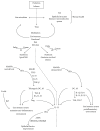Intestinal microbiota as modulators of the immune system and neuroimmune system: impact on the host health and homeostasis
- PMID: 25759850
- PMCID: PMC4352473
- DOI: 10.1155/2015/931574
Intestinal microbiota as modulators of the immune system and neuroimmune system: impact on the host health and homeostasis
Abstract
Many immune-based intestinal disorders, such as ulcerative colitis and Crohn's disease, as well as other illnesses, may have the intestines as an initial cause or aggravator in the development of diseases, even apparently not correlating directly to the intestine. Diabetes, obesity, multiple sclerosis, depression, and anxiety are examples of other illnesses discussed in the literature. In parallel, importance of the gut microbiota in intestinal homeostasis and immunologic conflict between tolerance towards commensal microorganisms and combat of pathogens is well known. Recent researches show that the immune system, when altered by the gut microbiota, influences the state in which these diseases are presented in the patient directly and indirectly. At the present moment, a considerable number of investigations about this subject have been performed and published. However, due to difficulties on correlating information, several speculations and hypotheses are generated. Thus, the present review aims at bringing together how these interactions work-gut microbiota, immune system, and their influence in the neuroimmune system.
Figures

References
Publication types
MeSH terms
LinkOut - more resources
Full Text Sources
Other Literature Sources
Medical
Molecular Biology Databases

